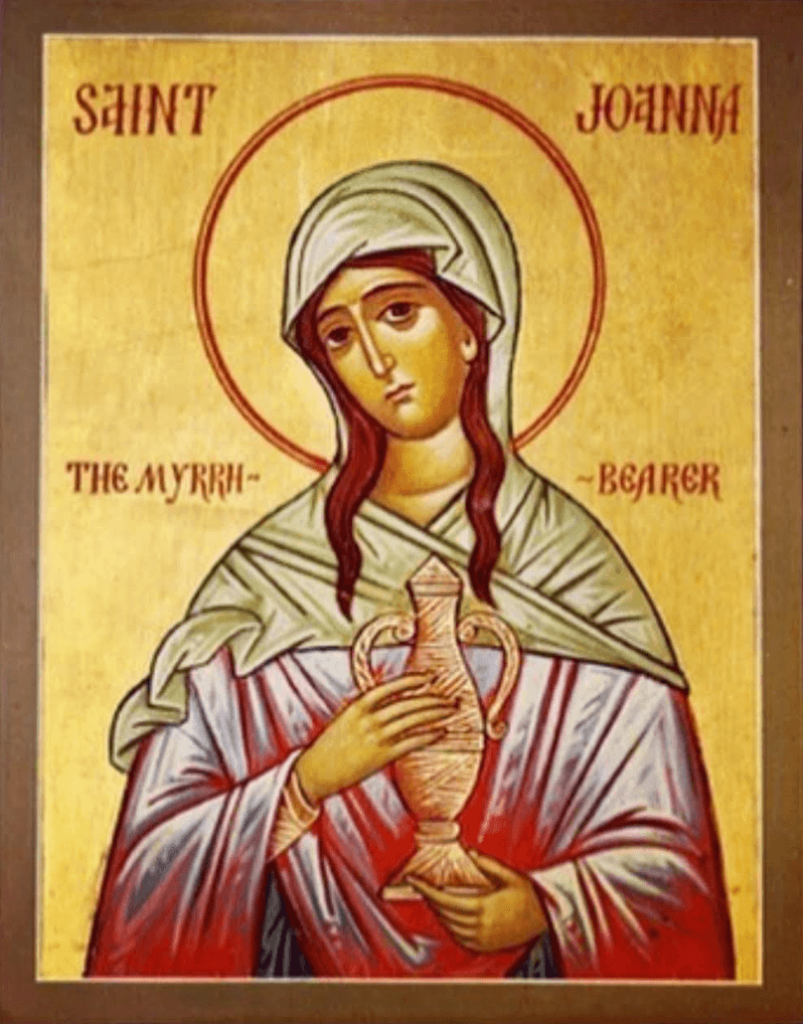St. Joanna
Saint Joanna, also known as Joanna the Myrrh-Bearer, was one of the women who followed and accompanied Jesus during his ministry. She is mentioned in the Gospel of St. Luke (8:3 and 24:10).
Background: Joanna is described as the wife of Chuza, who managed the household of Herod Antipas, the ruler of Galilee. This suggests that she belonged to a relatively affluent and influential family. She is listed as one of the women, along with Susanna, Mary Magdalene, and others, who “had been cured of evil spirits and infirmities”.
Disciple of Jesus: Once Joanna had been healed by Jesus, she became a devoted follower of Jesus and joined his group of disciples. She witnessed Jesus’ teachings, miracles, and ministry first-hand.
Participation in Jesus’ Ministry: Joanna, along with some other women, accompanied Jesus and the twelve apostles as they travelled from town-to-town preaching.
Witness to the Resurrection: Luke’s Gospel mentions Joanna as one of the women who were present at the crucifixion of Jesus and later visited the tomb to anoint the Holy Body of the Lord with spices. She was among the women who first learned from an angel of Christ’s resurrection (Luke 24:9-10) and played a significant role in spreading the news of His resurrection.

Generosity: Luke’s account further highlights that Joanna was one of the women who provided financial support for Jesus and the Apostles. Her resources helped sustain the needs of Jesus and his disciples during their travels.
Tradition: According to Church Tradition, Saint Joanna recovered the head of St. John the Baptist ‘’from an unclean place” after Herodias ordered it to be discarded. Joanna took the head and arranged for its proper burial.
Upper Room: Joanna, though not explicitly mentioned, is regarded as one of the women who joined the disciples, including Mary (the mother of Jesus), in the upper room for prayer (Acts 1:12-14). She was thought to have been present on the Day of Pentecost and to have been one of the group of 120 who chose Matthias the Apostle to fill the void left by Judas.
Saint Joanna reposed peacefully in the first century.
From the life of St. Joanna, there are several valuable lessons we can draw:
Recognition of the significant role of women: St. Joanna’s presence and involvement in Jesus’ ministry highlight the importance of women in spreading the message of Jesus and their essential roles as witnesses and supporters of His teachings. Her inclusion in the Gospel accounts challenges traditional gender roles and emphasizes the equality and value of women in the Kingdom of God.
Faithfulness and dedication: St. Joanna’s unwavering commitment to Jesus is evident in her decision to follow Him wholeheartedly. Despite her privileged position and access to wealth and resources, she chose to prioritize her faith in Jesus and actively participated in His ministry. Her life serves as an inspiration to remain faithful to Christ, regardless of societal expectations or personal circumstances.
Generosity and financial contributions: St. Joanna’s willingness to use her wealth and resources to support Jesus and His disciples demonstrates the importance of financial stewardship in serving the Kingdom of God. Her example encourages us to recognize and utilize our own resources for the advancement of God’s work and the well-being of others.
Steadfastness in times of trial: St. Joanna’s presence at the crucifixion and her continued dedication after Jesus’ resurrection highlight her unwavering commitment to the Lord. Her loyalty and persistence in following Jesus, even during difficult times, inspire us to remain steadfast in our faith, trusting in God’s promises and standing firm in our beliefs.
Persistence in proclaiming the Gospel: St. Joanna’s commitment to Jesus extended beyond His earthly ministry. Her dedication to spreading His message after His resurrection signifies the importance of continued evangelism and sharing the good news with others. Her example encourages us to persistently proclaim the Gospel, even in the face of challenges or opposition.
May St. Joanna’s life story inspire us to live out these lessons in our own lives as we seek to follow Jesus and serve His Kingdom.

